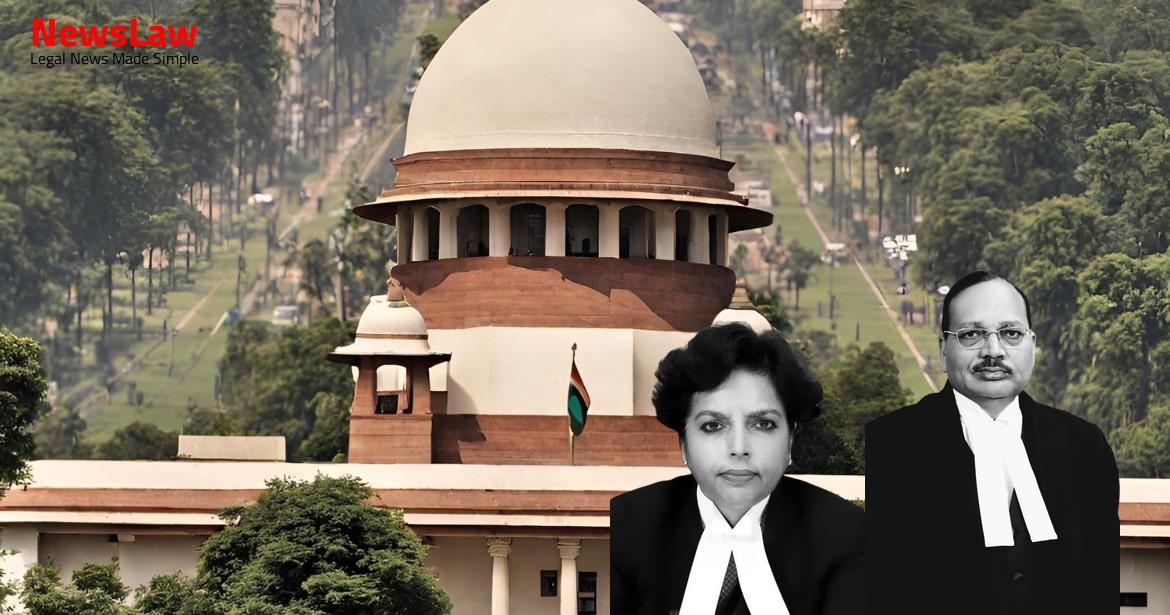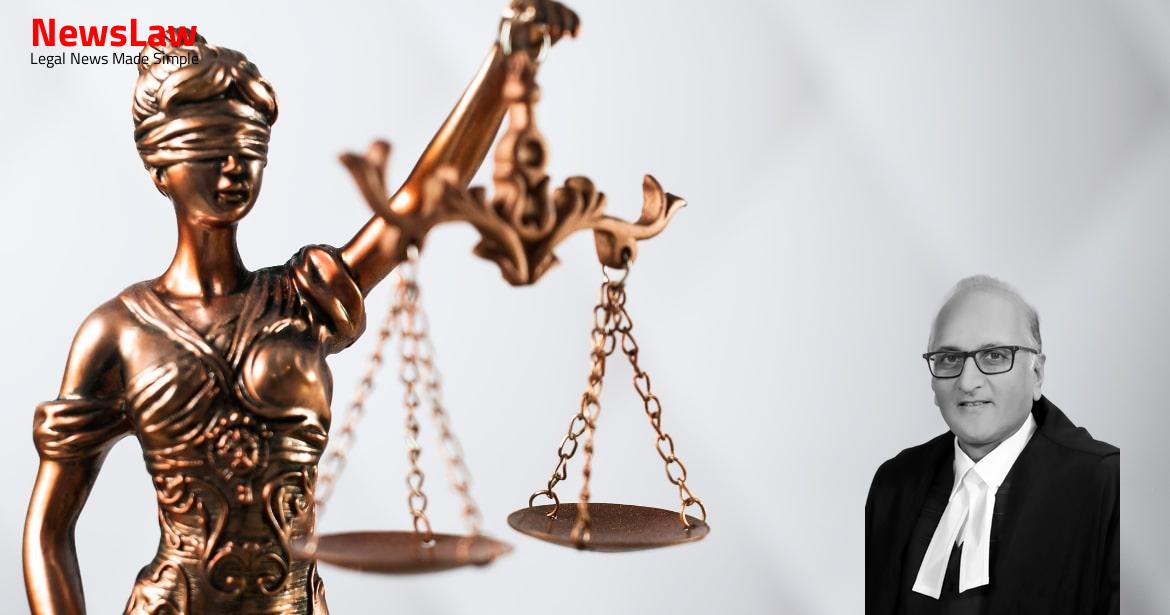The recent court case delved into the complex legal requirements surrounding the prosecution of public servants, especially in cases where the alleged actions are related to their official duties. The court’s analysis focused on the necessity of obtaining government sanction under Section 197 of the Criminal Procedure Code, highlighting the protection it provides to public officials from unjustified legal actions. This blog post explores the court’s interpretation and application of the law in ensuring procedural fairness and upholding legal standards in such cases.
Facts
- The Karnataka High Court dismissed the Habeas Corpus Petition (WP(HC) No.57 of 2013) filed by the respondent’s father as there were eight pending criminal cases against the respondent.
- The respondent was produced before the jurisdictional Magistrate in accordance with the law.
- Crime No.110 of 2013 from HSR Layout Police Station was transferred to the Central Crime Branch on 18-3-2013.
- The respondent filed a private complaint (P.C.R. No.17214 of 2013) against the accused appellant and other police officials alleging ill-treatment while in police custody.
- IIIrd Additional Chief Metropolitan Magistrate took cognizance against the appellant in the private complaint without prior government sanction.
- The appellant filed Criminal Petition No.319 of 2017 seeking to quash the order dated 27-12-2016 in the private complaint.
- The High Court did not quash the order but remitted the complaint back to the Magistrate with liberty for the appellant to apply for discharge.
- There were multiple cases registered against the respondent and his family under various sections of the IPC.
- The High Court observed that the Magistrate had tentatively opined that sanction was not necessary to proceed against the accused appellant.
- The Magistrate remanded the complaint back to the Trial Court with a direction for the accused appellant to appear and file an application under Section 245 of the Code of Criminal Procedure for discharge.
- The Karnataka High Court, in the impugned order, held that sanction was a legal requirement for the Court to take cognizance of a private criminal complaint against a public servant.
Also Read: Land Sale Dispute Legal Analysis
Issue
- Whether the Magistrate could have taken cognizance against the appellant in the absence of sanction under Section 197 of the Code of Criminal Procedure read with Section 170 of the Karnataka Police Act, 1963.
- Whether the High Court should have quashed the impugned order of the Magistrate or remitted the complaint to the Magistrate concerned for further proceedings.
Also Read: Judicial Review of Environmental Compliance Orders
Arguments
- Mr. Poovayya argued that there was no case against the accused appellant as the alleged excesses were in the course of official duty of investigating an offense.
- He emphasized that ill-treatment and torture could never be considered as part of official duty or under the color of official duty.
- Mr. Luthra argued that the need for sanction under Section 197 of the Criminal Procedure Code should be determined during the trial based on the evidence presented.
- The police officers were duty-bound to investigate the offense, and any excesses, if committed, were in the exercise of their authority.
- Mr. Poovayya highlighted that the respondent’s complaint of ill-treatment did not result in any injuries according to medical reports.
- He cited relevant court judgments to support his argument that the alleged offenses were related to the appellant’s duty as a police officer.
- Under Section 170 of the Karnataka Police Act, no prosecution can be initiated against a police officer without prior government sanction for acts done in the course of duty.
- The dissenting view of C.K. Thakkar J. in a specific case was discussed but not deemed applicable in the current scenario.
- Mr. Poovayya contended that the complaint against the appellant was an abuse of process and frivolous in nature.
- The offenses under Section 167 and 219 IPC require similar pivotal ingredients as the offense under Section 166 IPC, according to the appellant’s counsel.
- Mr. Luthra argued that the order of a Magistrate taking cognizance of a complaint cannot be challenged under Section 482 of the Code of Criminal Procedure citing relevant cases.
- High Court gave the accused appellant the liberty to apply for discharge under Section 245 of the Code of Criminal Procedure and directed the Trial Court to decide such application before recording evidence.
- Accused appellant had been vindictively accused out of vengeance for submitting an affidavit in a Habeas Corpus Petition filed by the respondent’s father in the Karnataka High Court.
Also Read: Legal Analysis on Limitation Period in IBC Proceedings
Analysis
- In the case of an intended suit for a wrong, one month notice must be given to the alleged wrongdoer.
- The plaint must indicate that notice has been served to the defendant and mention any tender of amends made by the defendant.
- A copy of the notice can protect a public servant or police officer from harassment via retaliatory criminal proceedings.
- Sanction for prosecution under Section 197 of the Code of Criminal Procedure is to prevent suits or prosecutions for acts done under color of duty without government sanction.
- The section applies to acts done by public servants even if not directly related to their official duties.
- The offense must be in respect of an act done or purported to be done in the discharge of an official duty.
- Section 197 of the Code of Criminal Procedure lays down the provisions for prosecution of judges and public servants.
- No court can take cognizance of an offense by a public servant in the discharge of official duty without prior government sanction.
- The provisions apply to members of the Armed Forces as well, with necessary government sanctions.
- Sanction for offences committed by a police officer falls within the scope of duty.
- Section 197 of the Criminal Procedure Code, read with Section 170 of the Karnataka Police Act, provides limited protection.
- An act outside the scope of a police officer’s duty does not require sanction.
- Section 482 of the Criminal Procedure Code allows for quashing of proceedings if bad for want of sanction, frivolous, or an abuse of court process.
- The necessity of sanction for criminal proceedings against a police officer varies depending on the connection to official duty.
- Abuse of process of the court can lead to quashing of proceedings under Section 482.
- Failure to obtain state government sanction for a police officer can invalidate a case.
- Reasonable connection to official duty determines the need for sanction.
- Protection under Section 197 applies to acts reasonably connected to official duty.
- Sanction’s necessity must be evaluated at any stage of proceedings.
- The intention behind an act by a police officer plays a vital role in determining if it falls within the scope of official duty.
- The High Court may not overlook jurisdictional requirements for sanction under Section 197(1) of the Criminal Procedure Code.
- The scope of operation of the Section is restricted to only those acts or omissions which are done by a public servant in discharge of official duty.
- Acts or omissions done by a public servant under the color of official duty are protected under Section 197 of the Code of Criminal Procedure.
- The protection granted under Section 197 is intended to prevent public servants from being unnecessarily harassed for acts connected to their official duties.
- Sanction for prosecution is necessary if the act complained of is directly connected with the official duties of the public servant, regardless of the actual propriety of the act.
- The requirement of sanction aims to protect police officers from retaliatory and frivolous proceedings when discharging their official duties.
- The law is well-settled that protection under Section 197 extends to acts related to the discharge of official duties by public servants, including police officers.
- Sanction is a legal requirement for the court to take cognizance in cases involving public servants.
- If cognizance is taken without sanction, it is considered illegal.
- The duty of the magistrate is to consider and address any illegality arising from lack of sanction even at subsequent stages.
- In this case, the High Court erred in law by not setting aside the Magistrate’s order taking cognizance despite recognizing the necessity of sanction.
- The High Court should have used its powers under Section 482 of the Criminal Procedure Code to quash the complaint instead of directing the appellant to seek discharge through Section 245 application.
Decision
- Judgment and order under appeal is set aside
- Complaint is quashed for want of sanction
- Appeal is allowed
Case Title: D. DEVARAJA Vs. OWAIS SABEER HUSSAIN (2020 INSC 436)
Case Number: Crl.A. No.-000458-000458 / 2020



